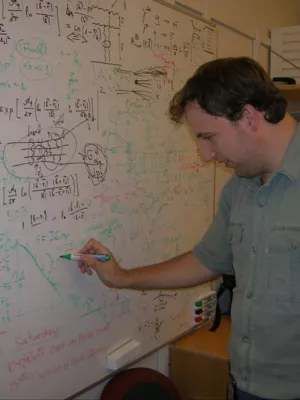
Roman Pasechnik
Senior lecturer

Dark Energy from graviton-mediated interactions in the QCD vacuum
Author
Summary, in English
Adopting the hypothesis about the exact cancellation of vacuum condensates contributions to the ground state energy in particle physics to the leading order in graviton-mediated interactions, we argue that the observable cosmological constant can be dynamically induced by an uncompensated quantum gravity correction to them after the QCD phase transition epoch. To start with, we demonstrate a possible cancellation of the quark-gluon condensate contribution to the total vacuum energy density of the Universe at temperatures T < 100 MeV without taking into account the graviton-mediated effects. In order to incorporate the latter, we then calculate the leading-order quantum correction to the classical Einstein equations due to metric fluctuations induced by the non-perturbative vacuum fluctuations of the gluon and quark fields in the quasiclassical approximation. It has been demonstrated that such a correction to the vacuum energy density has a form epsilon(Lambda) similar to G Lambda(6)(QCD), where G is the gravitational constant, and Lambda(QCD) is the QCD scale parameter. We analyze capabilities of this approach based on the synthesis between quantum gravity in quasiclassical approximation and theory of non-perturbative QCD vacuum for quantitative explanation of the observed Dark Energy density.
Department/s
- Theoretical Particle Physics - Has been reorganised
Publishing year
2013
Language
English
Publication/Series
Journal of Cosmology and Astroparticle Physics
Issue
6
Document type
Journal article
Publisher
IOP Publishing
Topic
- Subatomic Physics
Keywords
- dark energy theory
- quantum field theory on curved space
- quantum
- gravity phenomenology
- particle physics - cosmology connection
Status
Published
ISBN/ISSN/Other
- ISSN: 1475-7516

